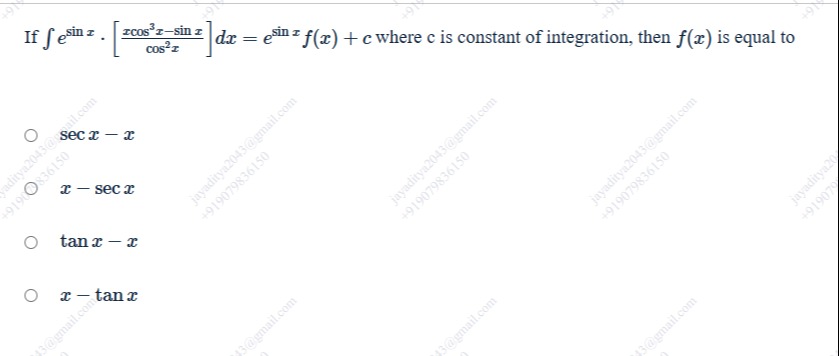Question
Question: If $\int e^{\sin x} \cdot [\frac{x\cos^3x-\sin x}{\cos^2x}] dx = e^{\sin x} f(x) + c$ where c is con...
If ∫esinx⋅[cos2xxcos3x−sinx]dx=esinxf(x)+c where c is constant of integration, then f(x) is equal to

sec x−x
x−sec x
tan x−x
x− tan x
x−sec x
Solution
The given integral is ∫esinx⋅[cos2xxcos3x−sinx]dx=esinxf(x)+c.
Let's simplify the expression inside the square brackets:
cos2xxcos3x−sinx=cos2xxcos3x−cos2xsinx=xcosx−cos2xsinx=xcosx−cosxsinx⋅cosx1=xcosx−tanxsecx.
So the integral becomes ∫esinx(xcosx−tanxsecx)dx.
We are given that this integral is equal to esinxf(x)+c.
Differentiating both sides with respect to x, we get:
dxd(∫esinx(xcosx−tanxsecx)dx)=dxd(esinxf(x)+c)
The left side is the integrand:
esinx(xcosx−tanxsecx)
The right side is the derivative of the product esinxf(x):
dxd(esinxf(x))=esinxdxd(f(x))+f(x)dxd(esinx)=esinxf′(x)+f(x)esinxcosx=esinx[f′(x)+f(x)cosx].
Equating the left and right sides:
esinx(xcosx−tanxsecx)=esinx[f′(x)+f(x)cosx]
Dividing by esinx (which is always non-zero):
xcosx−tanxsecx=f′(x)+f(x)cosx
f′(x)+(cosx)f(x)=xcosx−tanxsecx
We need to find the function f(x) that satisfies this equation. We can test the given options.
Option 1: f(x)=secx−x
f′(x)=secxtanx−1
f′(x)+f(x)cosx=(secxtanx−1)+(secx−x)cosx=secxtanx−1+secxcosx−xcosx=secxtanx−1+1−xcosx=secxtanx−xcosx.
This is not equal to xcosx−tanxsecx.
Option 2: f(x)=x−secx
f′(x)=1−secxtanx
f′(x)+f(x)cosx=(1−secxtanx)+(x−secx)cosx=1−secxtanx+xcosx−secxcosx=1−secxtanx+xcosx−1=xcosx−secxtanx.
This matches the required expression xcosx−tanxsecx.
So, f(x)=x−secx is the correct function.
Let's verify the general formula for integration: ∫eg(x)[g′(x)f(x)+f′(x)]dx=eg(x)f(x)+c.
In this case, g(x)=sinx, so g′(x)=cosx.
The integrand is esinx(xcosx−tanxsecx).
We need to check if xcosx−tanxsecx can be written in the form f(x)cosx+f′(x) for some function f(x).
If we take f(x)=x−secx, then f′(x)=1−secxtanx.
f(x)cosx+f′(x)=(x−secx)cosx+(1−secxtanx)=xcosx−secxcosx+1−secxtanx=xcosx−1+1−secxtanx=xcosx−secxtanx.
This matches the term multiplying esinx in the integrand.
Thus, the integral is ∫esinx[cosx(x−secx)+(1−secxtanx)]dx=∫esinx[g′(x)f(x)+f′(x)]dx, where g(x)=sinx and f(x)=x−secx.
Using the formula, the integral is esinxf(x)+c=esinx(x−secx)+c.
Comparing this with the given equation, we find f(x)=x−secx.
